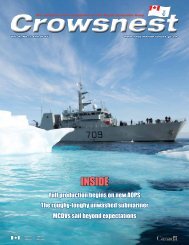Create successful ePaper yourself
Turn your PDF publications into a flip-book with our unique Google optimized e-Paper software.
2.4 Regulation <strong>of</strong> Ocean Space<br />
<strong>The</strong> UN Convention on <strong>the</strong> Law <strong>of</strong> <strong>the</strong> Sea (UNCLOS) has been called <strong>the</strong> “constitution <strong>of</strong> <strong>the</strong><br />
sea” <strong>and</strong> it is <strong>the</strong> normative/legal framework within which many maritime issues will continue to<br />
be addressed by states. 54 In effect since 1994, UNCLOS seeks to reconcile <strong>the</strong> traditional<br />
emphasis on <strong>the</strong> freedom <strong>of</strong> <strong>the</strong> seas to which all have access with more recent claims made by<br />
countries to control maritime space. To accomplish this goal, it recognises <strong>the</strong> dem<strong>and</strong> by<br />
countries for exclusive control over <strong>the</strong>ir coastal regions (hence <strong>the</strong> creation <strong>of</strong> <strong>the</strong> 200 nautical<br />
mile wide Exclusive Economic Zones or EEZs) while reasserting <strong>the</strong> principle <strong>of</strong> an ocean<br />
commons. (Figure 5 shows <strong>the</strong> relationship between territorial seas, EEZs <strong>and</strong> <strong>the</strong> high seas.)<br />
Ships, including foreign warships <strong>and</strong> military aircraft, have <strong>the</strong> formal right <strong>of</strong> innocent passage<br />
through EEZs, as indeed <strong>the</strong>y do in territorial waters. <strong>Maritime</strong> countries, however, enjoy<br />
exclusive jurisdiction over <strong>the</strong> resources found within <strong>the</strong> waters <strong>of</strong> <strong>the</strong>ir EEZ <strong>and</strong> on its seabed.<br />
As with any treaty, tensions have arisen over <strong>the</strong> interpretation <strong>of</strong> UNCLOS. This can be viewed<br />
as natural, particularly in a system <strong>of</strong> sovereign states. <strong>The</strong> pressure for changes in <strong>the</strong><br />
interpretation <strong>of</strong> that agreement is a reflection <strong>of</strong> <strong>the</strong> contending interests <strong>of</strong> <strong>the</strong> states most<br />
affected. This, too, will continue in coming decades for, as one leading naval <strong>the</strong>orist has written<br />
that dem<strong>and</strong> for “changes in <strong>the</strong> law <strong>of</strong> <strong>the</strong> sea derive from <strong>the</strong> manifest increase in <strong>the</strong><br />
importance <strong>of</strong> <strong>the</strong> sea relative to <strong>the</strong> l<strong>and</strong>.” 55<br />
Looking forward, countries (presumably most) interested in maritime order will continue to see<br />
international law as both a useful tool to advance <strong>the</strong>ir interests <strong>and</strong> some might even see it as a<br />
common good. Resort to <strong>the</strong> law will be regarded as an acceptable means for <strong>the</strong> resolution <strong>of</strong><br />
disputes, <strong>the</strong>reby making a positive contribution to international security. One sees this already.<br />
In recent years, maritime boundary disputes between Peru <strong>and</strong> Chile, <strong>and</strong> in <strong>the</strong> Barents Sea<br />
between Russia <strong>and</strong> Norway, were peacefully resolved: <strong>the</strong> former adjudicated by <strong>the</strong><br />
International Court <strong>of</strong> Justice <strong>and</strong> <strong>the</strong> latter after nearly 40 years <strong>of</strong> bilateral negotiations. While<br />
armed conflict can never be excluded as a possibility, reliance on international law will likely be<br />
<strong>the</strong> most effective mechanism that prevents an escalation <strong>of</strong> many maritime disputes.<br />
54 For <strong>the</strong> idea that UNCLOS represents a balance between exclusive <strong>and</strong> inclusive approaches to <strong>the</strong> oceans,<br />
see Natalie Klein, <strong>Maritime</strong> Security <strong>and</strong> <strong>the</strong> Law <strong>of</strong> <strong>the</strong> Sea (Oxford University Press, 2011), pp. 3–18.<br />
55 Ge<strong>of</strong>frey Till, Seapower <strong>and</strong> <strong>the</strong> Millennium (Sutton Publishing: Phoenix Mill, 2001), p. 6.<br />
DRDC-RDDC-2016-R085 13




